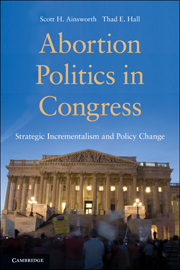Book contents
- Frontmatter
- Contents
- Tables
- Figures
- Acknowledgments
- Part I Strategic Incrementalism and the Political Backdrop for Abortion Politics in Congress
- 1 Some of the Politics Surrounding Abortion Policy
- 2 The Strategic Foundations for Incrementalism in Legislatures
- 3 The Nature of Congress and Incrementalism in Abortion Politics: Views from the Inside and Views from the Outside
- 4 A Short Legislative History of Abortion
- Part II Abortion in the House
- References
- Index
4 - A Short Legislative History of Abortion
Published online by Cambridge University Press: 05 June 2012
- Frontmatter
- Contents
- Tables
- Figures
- Acknowledgments
- Part I Strategic Incrementalism and the Political Backdrop for Abortion Politics in Congress
- 1 Some of the Politics Surrounding Abortion Policy
- 2 The Strategic Foundations for Incrementalism in Legislatures
- 3 The Nature of Congress and Incrementalism in Abortion Politics: Views from the Inside and Views from the Outside
- 4 A Short Legislative History of Abortion
- Part II Abortion in the House
- References
- Index
Summary
The “very purpose of a Bill of Rights was to withdraw certain subjects from the vicissitudes of political controversy, to place them beyond the reach of majorities and officials and to establish them as legal principles … One’s right to life, liberty, and property, to free speech, a free press, freedom of worship and assembly, and other fundamental rights may not be submitted to vote; they depend on the outcome of no elections.” (Justice Robert Jackson, West Virginia State Board of Education v. Barnette, 319 U.S. 624, 638 (1943))
Courts and the Idea of Legislating Abortion Policy
It has long been argued that the courts are best suited to handle issues revolving around values – certainly better suited than legislatures. The prominent legal scholar John Hart Ely quotes Harry Wellington at length. “‘If a society were to design an institution which had the job of finding the society’s set of moral principles and determining how they bear in concrete situations, that institution would be sharply different from one charged with proposing policies … It would provide an environment conducive to rumination, reflection, and analysis’” (Ely 1980, 56).
Ely himself is much less sanguine about the ability of judges and courts to discover or protect key guiding principles. The notion that the “judiciary has done a better job of speaking for our moral selves” rests upon “historically shaky” grounds (Ely 1980, 57). For Ely, preserving and reinforcing “representation functions” in the polity are fundamental court obligations (see, e.g., 1980, Chapter 4), but values or moral judgments are better left to legislative bodies (cf. Perry 1982). As long as courts ensure a wide array of free and fair election procedures, Ely feels that legislators are best capable of making policy – even those policies heavily weighted with moral judgments.
- Type
- Chapter
- Information
- Abortion Politics in CongressStrategic Incrementalism and Policy Change, pp. 90 - 122Publisher: Cambridge University PressPrint publication year: 2010



